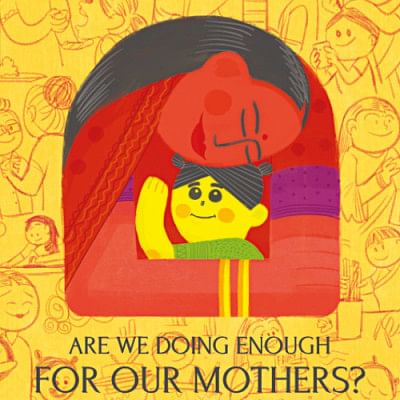Are we doing enough for our mothers?

One of the scenes you'll commonly see in Dhaka is mothers waiting outside schools and coaching centres for their children. My mother used to be one of them; she waited for hours on end to take me home safely like so many other mothers did for their children. I didn't realise how tedious the whole thing was until I had to wait for my sister one day. I hadn't given it much thought before, because like so many others, I had taken everything my mother did for me for granted.
The daily life of a mother involves juggling a variety of responsibilities, including meeting the needs of various family members, often at the expense of her own needs. In her TEDx Talk "Why Moms Are Miserable", Sheryl Ziegler, a Doctor of Psychology and a mother herself, recounts her own experience of when she had to drive herself to the hospital. She says, "Despite the fact that I was in pain, I was actually quite content." The reason for that was that she was exempt from having to do all the work she routinely does, and she was being taken care of for a change.
As the primary caregiver, mothers have to be attuned to every one of her infants' needs. The child grows and her duties increase. Her days increasingly get filled with birthday parties, doctor's appointments, and trips to the park or zoo, at times all of these on the same day. When the child steps into adolescence, she needs to accompany her children to classes from morning till night. Throughout this time, she might have the added work of taking care of her husband, in-laws, and her own parents while also cooking, cleaning, grocery shopping, doing the laundry, and hosting and attending events. She is expected to be her child's teacher, nurse, confidante, and a multitude of other things.
In short, being a mother involves a huge amount of work, and permanently changes a person's life. Psychiatrist Donald Stern, in a paper published in 1998, discusses how during the process of conceiving and giving birth, a new mental organisation forms in the mother. The paper also talks about a positive holding environment and says, "It has to do with psychologically framing, holding, and contextualising the mother in such a way that she feels validated, encouraged, supported." It mentions the many fears a new mother has, how she questions herself (the paper gives some examples of these: "Am I a competent human being? Can I love others? Will they love me?"), and how she observes and compares herself to other mothers.
Despite what the advertisements for soaps and beverages show us, the problems in the lives of mothers does not have a simple solution in the form of a new product. The situation is often a difficult one, and one where help is not present. Sheryl Ziegler, in that same talk, says, "In my practice as a child and family therapist, I have heard a familiar story over and over. Mothers are exhausted, overwhelmed and lonely in their lives." Add to this that nearly everyone judges a parent, and in our patriarchal society, especially a mother.
Further worsening the situation is the underlying assumption many have that motherhood comes easily and naturally to everyone. Moreover, mothers are glorified as superhumans. However, in the process of doing this, we forget that mothers are also ordinary individuals who like everyone else are trying their best. A look at a woman who has just had a baby demonstrates how mothers need help and support.

Zakiur Rahman, Obstetrician and Gynaecologist at Women's and Children's General Hospital, says, "Giving birth to a child causes immense physical and emotional pressure. The support of her family, both hers and that of her husband's, is crucial during this stage. The woman, already suffering, needs to rest and recover. She needs the assistance of people around her and be assured that her child is being taken care of while she is resting."
However, worrying during this period is almost inevitable. A mother will still be her child's primary caregiver and have to fulfil the constant needs of her child. This whole process often takes an immense toll on the mother. He further adds, "As the mother cares for the child, she frequently loses sleep. This affects her abilities to function and alters her mood. Many mother start suffering from postpartum psychosis. If not addressed properly, it can lead to a psychological breakdown. So family members need to be understanding and supportive during this period."
Discussions about women's health is often shunned in our society, and this further exacerbates their situations as it leads to people knowing very little regarding women's health. From the time after a woman gives birth to the time a woman reaches middle age, women's bodies go through a wide range of changes from postpartum depression to menopause. The latter condition is as misunderstood, if not more, than menstruation. As a result, this, combined with unrealistic ideas of mothers as infinitely tolerant and perfect, causes family members to misunderstand the mother, often leading them to be frustrated with their mother's sudden recent change in behaviour. Ignorance of such matters not only results in people being unable to help mothers but also makes it harder for us to empathise with them.
Often societal expectations worsen the conditions of mothers already struggling to cope with the mammoth responsibility of bringing up another human being. With every person having an opinion on the right way to parent and every person blaming a mother for a child's failure, we increase the problems mothers face in a life of constant, and often thankless, caregiving.
Almost every time, we downplay the critical contribution mothers have towards the development of the next generation. In an increasingly capitalistic world, all that which doesn't involve a monetary transaction loses importance. But even though we don't attach a price tag to all that they do, the value of a mother's work is undeniable. Their job is not only an immensely complex and difficult one, but one that is often without rewards.
Admitting the latter part isn't easy, because there is stigma attached with expressing any sentiment about motherhood that isn't rosy and blissful. While many say that there is no greater joy than watching your children grow up, many more fail to say how draining and overwhelming parenting can be, both physically and emotionally. Moreover, stereotypical notions of motherhood as a woman's duty not only makes their efforts go unnoticed but takes away their right to express any anxieties they may be having or any difficulty they may be facing in raising their children without feeling guilty. Saying that mothers are just doing what they are supposed to do leads us to not be appreciative of the efforts mothers put in. They too need support and appreciation, but often don't get any beyond some posts shared on social media.
So the next time you see mothers waiting outside their children's classrooms, ask yourself if we're doing enough for our mothers.
Reference
1. https://pediatrics.aappublications.org/content/pediatrics/102/Supplement_E1/1250.full.pdf
Aliza is Matilda resurrected. Reach her at [email protected]

 For all latest news, follow The Daily Star's Google News channel.
For all latest news, follow The Daily Star's Google News channel. 



Comments